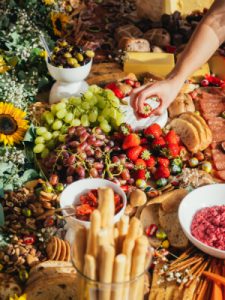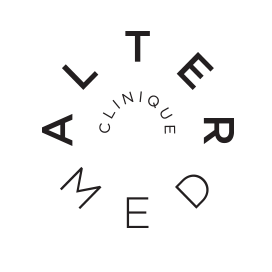Clinique Altermed
Nutrition montréal

The concepts of intuitive and mindful eating have grown enormously in popularity in the last few years.
These new ways to think about food and eating are very different from the traditional ways of the 80s and 90s and even 2000’s.
And when new & (wildly) different ideas about nutrition are suggested, it can take a while to understand how they can relate to your life and help you improve your health.
Even if you are familiar with intuitive eating concepts, you may be wondering, “How can intuitive eating help me?”.
Let’s discuss how familiar food issues and concerns can be improved with practicing mindful and intuitive eating.
How can intuitive eating help me?
The terms intuitive eating and mindful eating are not very descriptive. So using words and terms that we use every day to describe our difficult relationship with food is helpful to understand how they can work for us. Here are some common thoughts that you may be thinking or have heard others use:
“My eating is out of control”
Perhaps you find yourself often eating when not hungry or want to better deal with your cravings (maybe you even feel out of control with cravings). Intuitive eating can help us feel more in charge of choosing when to eat rather than feeling compelled and pushed into eating. If you binge or feel you struggle with food addiction, there is hope! A solution that does not include more food restriction is proven to be way more effective in healing (versus a dieting approach and eliminating the foods you binge on). Some people call it “mindless eating” while others use the term “distracted eating”. No matter what words you use, being an intuitive eater helps increase our ability to know when we are not paying attention to our eating and gently bring our attention to the present (either to enjoy the food or realize that we aren’t enjoying it).
“I don’t want to diet, but I don’t know what else to do”
Maybe you have heard of the “non-diet” approach to healthy eating, but aren’t sure how to do this. If you desire a less restrictive approach to food, nutrition, and health- this is what intuitive eating is all about. We don’t actually need rules and diet plans to make sure we eat “right”. However, it is completely understandable that the allure of dieting (“we’ll do the thinking for you” and “follow our plan for guaranteed success”) and the fears they plant in our minds (“your size is a testament to your lack of knowledge” and “left to your own devices, you’ll make the wrong decisions”) draw us to them.
Do you feel that decisions about food (like portions/food choices) are overwhelming? That you never seem to know what to eat, or even what you want to eat?
Having followed rigid meal plans or food rules can make seemingly simple food decisions very difficult. Plans and rules don’t allow us to practice listening to our hunger levels or tastes. To make matters more difficult, these hunger signals still peak through and conflict with the food rules, making us go crazy with uncertainty on what to do.
If you want to find middle ground between dieting and binging as well as want guidance in moving away from dieting, mindful and intuitive can do just that. It may sound radical and so very different from what you’ve tried in the past BUT if you always did what you’ve always done, you’ll always get what you’ve always got. If dieting has always been followed by binging, weight regain or frustration, (which it does for most people), why not try a different strategy?
Many people with whom I speak state that mindful eating “spoke” to them but they weren’t sure how to make it work in their life. Reaching out to a non-diet, weight neutral dietitian to help guide and support you can be invaluable. Joining a local support group can be a great help too.

“I wish dieting worked like it used to”
Feel caught in the cycle of dieting/binge eating/dieting? Or feel you always “ruin it” by overeating after you’ve followed a diet? This is a normal response to restricting food and energy. Our body can’t be tricked into eating less than it needs without it pushing back.
If you have dieted in the past, the first few times you tried to restrict your food may have seemed easy or led to promised results. However, our body is quick to respond and save us from the perceived (and actual) starvation. It pushes the mind to think about food, seek out opportunities to eat and even increases our ability to smell (among other things). All in order to keep you healthy and avoid harming your health.
Dieting can also lead to being overwhelmed with food choices when we resume normal eating. Following a diet plan or a set of food rules does nothing to help us practice eating in tune with our hunger or our taste preferences.
Feeling preoccupied with food, fearing foods and not trusting your appetite can be directly due to making certain foods off limits. Adopting an “all foods fit” mindset is a very powerful way to combat these struggles.
Remember- your body is trying to keep you healthy! This includes making starving and weight loss more difficult the more you engage in it.
“I have a love/hate relationship with dieting and weight loss”
Some of my clients can identify that past or current dieting and restrictive eating is playing a role in their non-hunger eating or feeling out of control with food. Imagine that! The very thing we are told will help us eat less (dieting) can lead to eating more.
Too often the idea of allowing all foods to fit is scoffed at and (erroneously) blamed for “overeating” or unhealthy eating. However, studies have shown that allowing all foods to fit into our lives actually decreases our cravings for them and helps us eat them in moderation. If you love the idea of “all foods fit” idea but don’t know how to carry this out, intuitive eating can teach you how.
When taking a hard, long look at your past experiences with dieting and restricting foods, do you feel they have reduced your quality of life? Maybe they have taken away time, energy, money, pleasure & freedom and stifled your ability to just enjoy life and food. Dieting is not normal and should never be expected of anyone in order to earn health or affection.
Are you frustrated with the cycle of losing and gaining weight? Or feeling dizzy with cycling “on” and “off” the wagon? Intuitive eating helps to stop weight yoyoing and any shame spiral you may experience by “falling off the wagon” since there is no wagon.
If you have a history of obsessing over numbers like your weight, calories or steps, intuitive eating is a way to guide yourself when making food choices that do not require tracking or feeling beholden to numbers. It is a safe way to reconnect with your body and food that does not promote disordered eating.
“I feel ashamed or uncomfortable in my body”
It may sound strange that intuitive and mindful eating can help beyond battles with food, but it can! If you struggle to feel comfortable (or less negative) in your body or with your body size, being more mindful encourages and guides us on how to be more accepting of your body and even grateful for what our body can do for us.
In today’s fatphobic world, it is too common for people to feel their body is too big or not acceptable. The “embrace all your curves” approach does not resonate with everyone- and that is ok! A non-diet, body- positive approach to eating and living can help you feel more comfortable in your body without having to starve or undergo surgery.
If you want to understand what a “natural healthy weight” means and how to find yours, becoming an intuitive eater is the best way.
Intuitive eating can help you in so many different ways It may be a new(ish) way of thinking about food, but I guarantee your view on food, eating and your body will forever be changed for the better!


